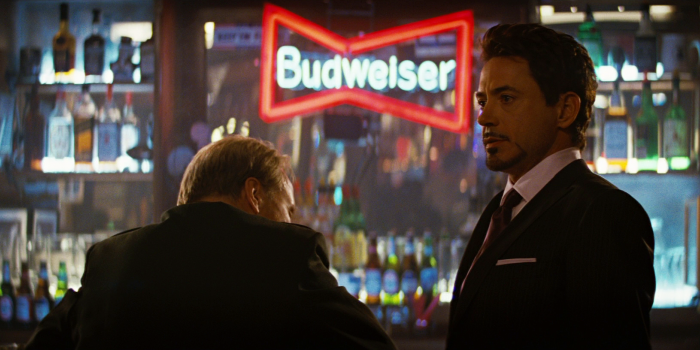
Cast: Xavier Dolan, Pierre-Yves Cardinal, Lise Roy
Director: Xavier Dolan
Country: Canada | France
Genre: Drama
Editor’s Note: The following review is part of our coverage of the Cork Film Festival. For more information on the festival visit corkfilmfest.org or follow the Cork Film Festival on Twitter at @CorkFilmFest.
“You’ll set things straight,” instructs lumbering farmer Francis at an early juncture in Tom at the Farm, a strange thing to say given he’s insisting the eponymous visitor over whom he domineeringly stands perpetuate a fiction. The irony is telling. It’s indicative of just how inherently unjust our society is that prejudice is even engrained in our everyday language: it’s not so important that the straight story be true, just as long as it’s right. There’s nothing right, and certainly nothing straight, in Francis’ eyes about the relationship Tom shared with his late brother, whose funeral facilitates their meeting and provides the venue for this cautioning. The dead are dead, what good would it do those left behind to learn, too late, the truth about them?
…it’s little surprise that Dolan should turn with Tom at the Farm to the precise opposite: to his prior films’ normalisation, this is a demonization, equating otherness with evilness—or at least allowing its characters to do so—and seeing the seeds sown bear fruit by way of a thriller structure suitably compared to Highsmith and Hitchcock.
 It’s this kind of laissez-faire logic to which Tom falls prey—to which, the film suggests, anyone fairly might—much as he’s shocked to learn his lover was closeted. With its note-perfect plot progression, Tom at the Farm simply allows the outcome to unfold, watching what happens when intolerance is tolerated and otherness is pushed aside for fear of upsetting the norm and those who abide by it. This farm is a magnificent microcosm: a unit of society, much like the family who resides on it, its primary position to a contemporary economy—not to mention the agrarian ties to ancient civilisation—makes of it an appropriate little allegory for human evolution at large, and the way our uglier attitudes have emerged from our disinclination to upset the apple cart, however rotten its contents may be.
It’s this kind of laissez-faire logic to which Tom falls prey—to which, the film suggests, anyone fairly might—much as he’s shocked to learn his lover was closeted. With its note-perfect plot progression, Tom at the Farm simply allows the outcome to unfold, watching what happens when intolerance is tolerated and otherness is pushed aside for fear of upsetting the norm and those who abide by it. This farm is a magnificent microcosm: a unit of society, much like the family who resides on it, its primary position to a contemporary economy—not to mention the agrarian ties to ancient civilisation—makes of it an appropriate little allegory for human evolution at large, and the way our uglier attitudes have emerged from our disinclination to upset the apple cart, however rotten its contents may be.
To suggest that Xavier Dolan’s film—his fourth, in five years—is perhaps his strongest for its embrace of genre, as so many have, is to miss the melodramatic overtones of his prior work, which saw sweeping Sirkian grandeur as the root to a normalisation of non-traditional sexuality. Given that the latest of these, Laurence Anyways, pushed that point to its apex, it’s little surprise that Dolan should turn with Tom at the Farm to the precise opposite: to his prior films’ normalisation, this is a demonization, equating otherness with evilness—or at least allowing its characters to do so—and seeing the seeds sown bear fruit by way of a thriller structure suitably compared to Highsmith and Hitchcock.
This is a beautiful blend of tones: much like its namesake, this is a film bitterly and angrily pained, yet no less likely for it to explode in uneasily laughter at the absurdity of it all.
 And what luscious fruit it is: disconcertingly sinister though so much of its content might rightly be, Tom at the Farm is a film awash with the fun of the movies, a weird and wonderful confluence of eerie atmosphere and out-there camp as only Dolan could do it. It’s a great film first for the sheer success of its entertainment, second for the complex connotations it creates, pushing the pared-back plot—its stage play origins are evident—to the peak of its potential for suspense and expertly deflating the resultant tension with oft-out-there comic relief. This is a beautiful blend of tones: much like its namesake, this is a film bitterly and angrily pained, yet no less likely for it to explode in uneasily laughter at the absurdity of it all.
And what luscious fruit it is: disconcertingly sinister though so much of its content might rightly be, Tom at the Farm is a film awash with the fun of the movies, a weird and wonderful confluence of eerie atmosphere and out-there camp as only Dolan could do it. It’s a great film first for the sheer success of its entertainment, second for the complex connotations it creates, pushing the pared-back plot—its stage play origins are evident—to the peak of its potential for suspense and expertly deflating the resultant tension with oft-out-there comic relief. This is a beautiful blend of tones: much like its namesake, this is a film bitterly and angrily pained, yet no less likely for it to explode in uneasily laughter at the absurdity of it all.
The labels piled on Dolan since his powerful debut in I Killed My Mother, wunderkind and enfant terrible chief among them, have pointed above all to an oft-perceived petulance in his aesthetic and emotional tendencies. Few will find the same in Tom at the Farm, whose comparatively tame approach is that of a talent that’s indisputably come of age. As an actor as much as anything else—and there’s a lot to choose from; subtitler is just one of the many ancillary roles the director assumes—Dolan is distinguished here by a maturity and a restraint missing, if not necessarily missed, in his work to date. Ironic, in a sense, of a film that has so much to say about repression: from the outflow of honesty in its opening scene to the raw repercussions of the opposite in its last, Tom at the Farm is a movie that truly sets things straight.
[notification type=”star”]90/100 ~ AMAZING. Tom at the Farm is distinguished by a maturity and a restraint missing, if not necessarily missed, in Dolan’s work to date.[/notification]



